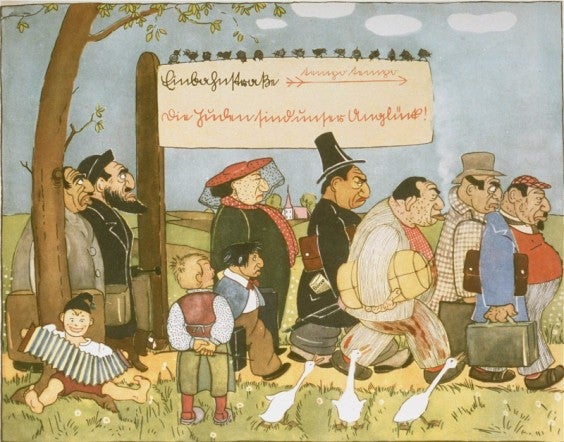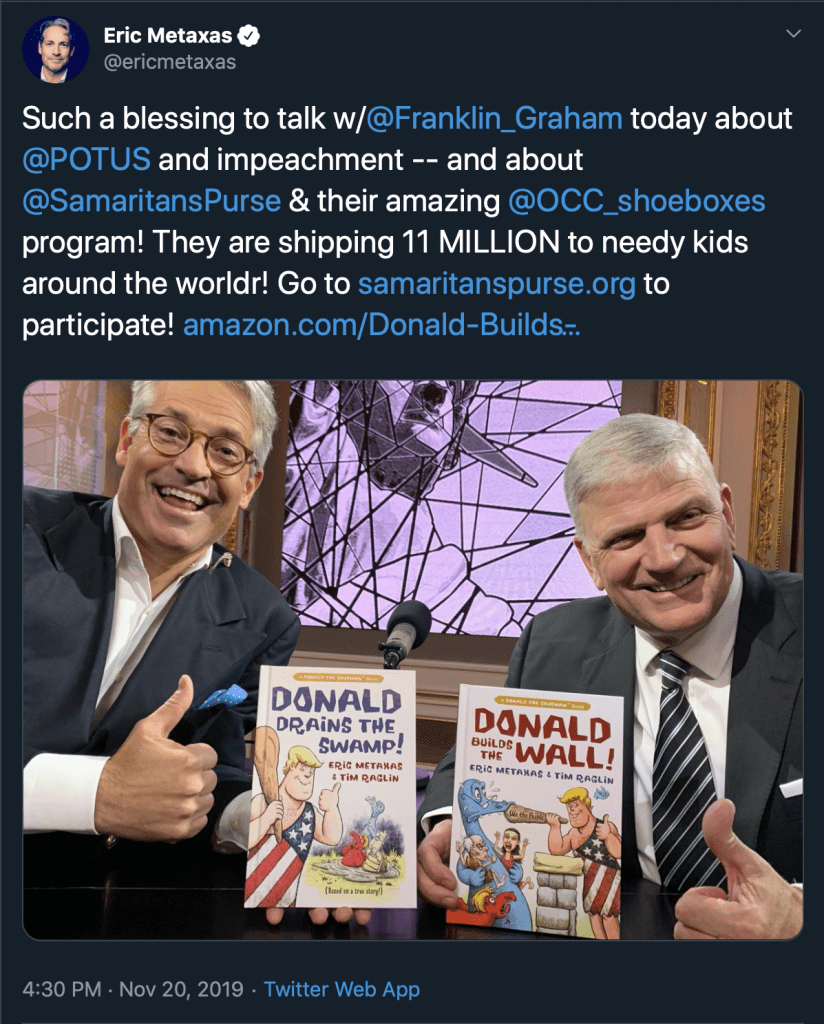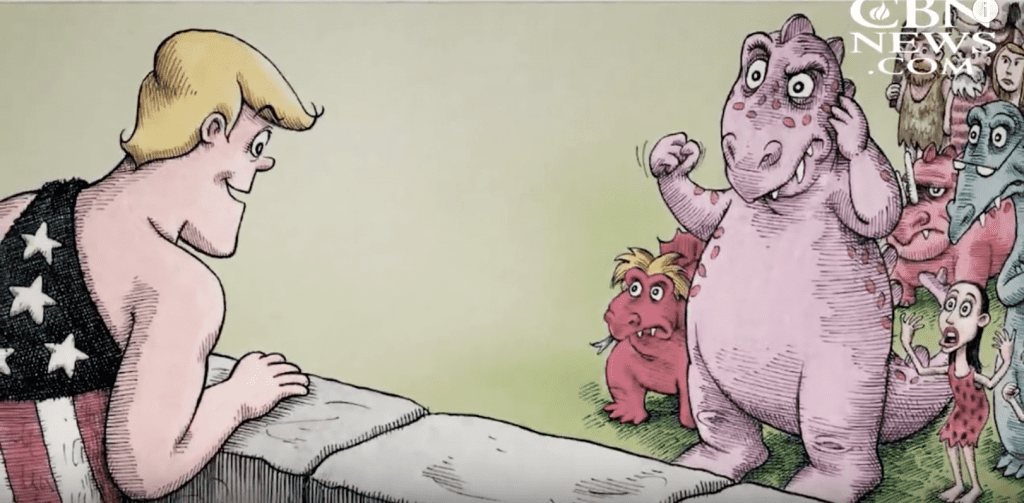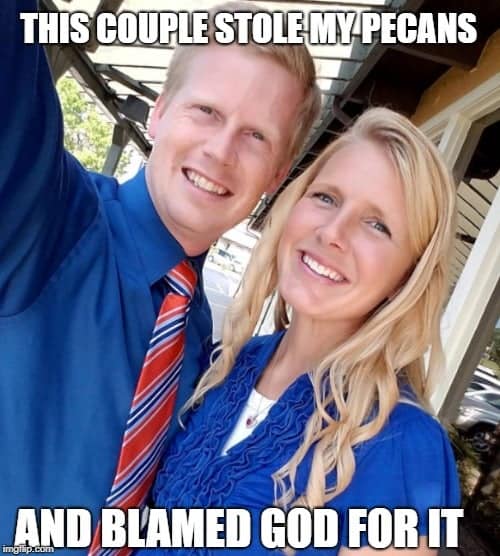What in the seven circles of hell is this?
What is this. I’m serious here. What are these monstrosities in Eric Metaxas and Franklin Graham’s hands? I am afraid of what I will find if I ask, but I must know.
Let’s have a look, shall we?
This is the Amazon blurb for Donald Builds the Wall:
After Donald the Caveman drained the Swamp and the greedy Swamp Creatures fled, the cave people were free! So all kinds of great things began to happen. They invented fire and the wheel — and their economy was booming!
Soon folks from other kingdoms began arriving to join the winning experiment in liberty! Most were freedom-loving, but some only caused trouble. And then the awful Swamp Creatures decided to put together a caravan of troublemakers to come back and take over the country! What should the free people do? Donald knew the answer…
BUILD… THE… WALL!!!
What. The. Hell.
I can’t with this. I just can’t.

Oh. Oh no. Oh no no no, I know why this feels familiar.
Years ago when I was in college, I went on a tour of the university archives. They had an original Gutenberg Bible, and other famous texts—and an original Nazi children’s book published in the 1930s.
Shit shit shit. That’s what this reminds me of.
The book was all about the trouble the Jews caused. And the illustrations—oh, the illustrations. The Jewish people were built as hunched caricatures, while the Aryan German people were strong and tall.

Guys. Guys.
I’m not even sure what to say at this point. Reading that Nazi children’s book a decade ago made a bigger impression on me than I’d realized. And I tell you, I am getting the same vibe from Metaxas’ book.
We are at the fascist children’s literature stage. This is not a good place to be. Indeed, this is a very, very bad place to be. This isn’t edgy, or funny—it’s dangerous.
Metaxas is a well-known Christian author. Franklin Graham, also pictured in the image at the beginning of my article, is one of the best-known evangelical leaders in the country. And yet—well—here we are.
I try not to throw the word fascism around lightly, I really do. I wasn’t initially planning to use it here at all. When I first came upon the tweet with the picture of Metaxas and Graham holding these books, I expected myself to be horrified. I expected to take away some lesson and write about it. What I didn’t expect was to be reminded so strongly, so viscerally, of a Nazi children’s book I viewed in an archive a decade ago.
And yet—and yet—here we are.
I watched a video of Metaxas doing a “dramatic reading” of his book. I wanted to make sure I wasn’t being unfair to him—I do try to give everyone the benefit of the doubt, and my friends still me I hand out way too many second chances.
Anyway, at one point during his reading, Metaxas paused, noted the scaly swamp creatures in that page’s image, and called it “a Maurice Sendak homage.” I cannot get over how damnably disrespectful this is. Sendak was born in New York City in 1928. His parents were Polish Jewish immigrants. His childhood was overshadowed by the death of much of his extended family in the Holocaust. To drag Sendak in, as though he would approve of this project, is horrific—and Sendak died in 2012, so he can’t exactly object.
I have spent the past month losing the last shred of hope I had for this country—and now I see this. Do you know what I did while writing this post? I cried. I sat on my couch and cried. Everything is broken. I don’t know how to stem this tide. I can’t see a way through.
Note: After I wrote and published the above post, Several readers urged me not to leave this piece on such a downer. One mentioned a Jewish quote: “It is not up to you to complete the task, but you cannot desist from it.” As I thought on that, two other quotes came to mind.
First, I’m reminded of something my father said, years ago, when I was growing up in a right-wing evangelical household. I asked him why we spent so much time trying to win elections and restore the country to its Christian roots, if we believed the world was just going to get worse and worse until the rapture and the tribulation (we were dispensational premillennialists in our eschatology — think the Left Behind books). My father’s answer? “We still have to try.” That feels oddly applicable.
Second, I’m reminded of the following quote from The Lord of the Rings, which feels relevant:
“I wish it need not have happened in my time,” said Frodo.
“So do I,” said Gandalf, “and so do all who live to see such times. But that is not for them to decide. All we have to decide is what to do with the time that is given us.”
This perspective is helpful. We can’t control what ends up happening, but we do control what we do as individuals. That—and that alone—is what we’re responsible for. Somehow, that feels much more manageable. That feels like something I can handle.
I have a Patreon! Please support my writing!
















